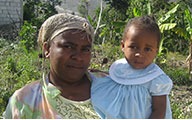
Providing Assistance and Reducing Risk for Those Affected by Natural Disasters
The Expanded Food Security Program (EFSP) provided assistance to people affected by natural disasters in Haiti, building on initiatives of the USAID Title II MYAP. ACDI/VOCA coordinated with Solidaridad, a Spanish nongovernmental organization (NGO), and Agro Action Allemande, a German NGO funded by the European Community Humanitarian Office.
In 2008 Haiti was hit by a hurricane, followed by a devastating earthquake in 2010. In August and October 2012, two major hurricanes caused further damage in Haiti. These disasters destroyed crops and displaced many people. As a result, malnutrition, especially among children, has been a widespread problem and there has been heavy reliance on expensive imported foods.
The EFSP worked to achieve the following:
- Improve the short-term food security situation of hurricane-affected vulnerable households through agricultural production support
- Improve the short-term food security situation of hurricane-affected vulnerable households through nutrition and health support
- Improve the ability of institutions and communities to identify and successfully respond to vulnerabilities and impending shocks
Seeds and Grants
The project worked with 10,159 vulnerable households to help them gain access to better crop seeds to grow more-nutritious food in greater quantities. The project improved access to water purification tools and equipment for 2,006 households in areas prone to cholera. To combat deforestation, the team procured and distributed 50,320 tree seedlings, including fruit-tree seedlings, to watershed areas in collaboration with local governmental authorities.
Cash for Work
During the most food-insecure season in Haiti, the “période de soudure,” ACDI/VOCA began the Expanded Food Security Safety Net Cash for Work Response. These activities served to provide immediate cash and act as an income safety net for the worst-affected rural households. The cash-for-work activities strengthened food purchasing power for emergency-affected households at risk of experiencing acute hunger due to loss of income.
Cash-for-work activities were identified and prioritized with strong participation by local authorities, community groups and leaders. ACDI/VOCA carried out discussions with local officials to agree upon criteria for participation in the program and the daily wage, ensure community mobilization, prevent conflict, and minimize disruptions to local markets and production.
Infrastructure
Working closely with local authorities and the Haitian government ensured buy-in for infrastructure projects. This helped establish long-term sustainability of the sites and aligned them with the overall short-term strategic goal of restoring agricultural productive assets for the upcoming planting seasons. The project coordinated communication about roles, responsibilities and proposed activities between the government, the beneficiaries and their communities.
Reducing Risk
In order to reduce future environmental risks, and to address damage caused by Hurricane Sandy, the MYAP promoted natural resource management activities, which continued under EFSP:
- Soil conservation, including building dry walls, ravine protection, gully plugs and live barriers (all sites)
- Rehabilitation of irrigation systems and canals
- Nursery development and reforestation (implemented primarily by women)
- Watershed management (implemented primarily by women)
- Clearing of drainage canals and removal of debris from flood and landslide-prone areas in preparation for future rainfall
- Other agriculture and natural resource activities to mitigate deforestation
According to local community leaders, these environmentally and economically conscious activities had a positive impact on the affected communities.





